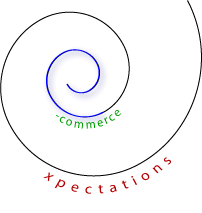In the post-Internet-boom period, it’s easy to forget about some old friends, so here I thought I’d drop in and revisit e-commerce…
 The old joke about commitment being like a ham and eggs breakfast certainly applies to producers (of goods) and consumers in the industrial economy. The punch line is that the chicken (consumer) is involved, but the pig (producer) is committed. The old joke about commitment being like a ham and eggs breakfast certainly applies to producers (of goods) and consumers in the industrial economy. The punch line is that the chicken (consumer) is involved, but the pig (producer) is committed.
A large part of producers’ inflexibility today is due to the fact that they are committed to bits (as opposed to bytes) at all stages of production and distribution: inputs, inventory, safety stocks, unsold goods, returns “… the whole catastrophe,” as Zorba says. These commitments are, in many cases, more important to producers than putting the customer first, and they represent a critical barrier to industrial economy companies’ intimacy with consumers because companies must sacrifice customer needs to maintain their operating realities. (For more on this, see Transformation: from Self-contained Company to Networked Global Organization.)
E-Commerce is steadily liberating producers from this dilemma in many categories. Let’s take a banal example. Probably most readers have shopped at “Earth’s Biggest Bookstore.” For many people, it defined the e-commerce experience. […]
A blog is not like a plant of the desert variety; it needs watering more often, so here’s an excerpt from my imminent Market Advisory on the marketing tectonic shift:
The Mirror: Customer Experience and Intimacy
We will see more changes in marketing practices from 2006-2015 than in the rest of the profession’s history because marketing will be the vanguard for the shift from an industrial economy to a knowledge economy, which will demand competence in all encompassing customer experience in order to achieve differentiation. Similarly, the globalization of markets is accelerating: emerging markets will represent extraordinary potential, but addressing them will demand unprecedented innovation. In a bright spot, ongoing CRM and BI initiatives, combined with continuing standardization of architecture (SOA) and messaging (Web services, XML), will begin to deliver the proverbial 360° view of the customer.
The Customer Experience Imperative
The customer experience will be mandated from producer and consumer quarters. Consumers have product fatigue. In many categories, there are too many choices with little differentiation save price. Producers will have unprecedented information, which they will explicitly use to create experiences. In fact, no consumer wants a product or service anyway; rather, consumers buy products and services in order […]
The End of Corporate Imperialism, by C.K. Prahalad and Kenneth Lieberthal, encapsulates the obvious elegantly and factually, and its thesis is far more true today than in 1998, when it was written: “Too often, companies try to impose Western models of commerce on developing countries. They’d do better—and learn more—if they tailored their operations to the unique conditions of emerging markets.” Western MNCs (multinational corporations) perceive the primitive state of consumption in emerging markets, and they too often develop a strategy in which they: 1) focus on the extreme minority of wealthy consumers and/or 2) address the order of magnitude larger middle tier of the market by offering their past-mature products with minor cosmetic changes.
This is another symptom of MNCs’ being stuck between industrial and knowledge economies. As I stated in my Transourcing Point of View, “Enterprises are ambivalent about innovation and product creation because they represent an inherent conflict: the drive to amortize past investments (including process-oriented constraints of marketing, distribution, service, etc.) conflicts with companies’ need to satisfy customers’ wishes for novelty. In practice, this too often leads to vapid product extensions.” The industrial-era enterprise derived its competitiveness largely through production and distribution efficiency, and it marketed […]
In the entry on innovation, I mentioned that an excessive focus on the numbers produced irrational behavior, and I found a perfect example of it this morning. Coca-Cola spends millions of dollars on developing new flavors of Coke, most of which have proven to be well publicized, expensive flops, at least compared to projected goals. According to The Wall Street Journal (“U.S. Thirst for Mexican Cola Poses Sticky Problem for Coke“), the growing Hispanic community in the U.S., a large portion of which is from Mexico, thirsts for its home-grown version of Coke, which Coca-Cola refuses to import due to its agreements with U.S. bottlers. Some enterprising distributors manage to quasi-circumvent the system to import just under $120 million of soda into the U.S. each year. Coke threatens retailers and distributors with legal niceties when bottlers cry foul but otherwise looks the other way.
Let me get this right. Coke spends millions on developing product extensions that flop, yet it has a $120 million nascent market for a product that already exists, which it is resisting.. all because of its relationship with its distribution channel. This is a perfect example of industrial economy thinking: restrict and control while putting customers […]
|
|
 The old joke about commitment being like a ham and eggs breakfast certainly applies to producers (of goods) and consumers in the industrial economy. The punch line is that the chicken (consumer) is involved, but the pig (producer) is committed.
The old joke about commitment being like a ham and eggs breakfast certainly applies to producers (of goods) and consumers in the industrial economy. The punch line is that the chicken (consumer) is involved, but the pig (producer) is committed.